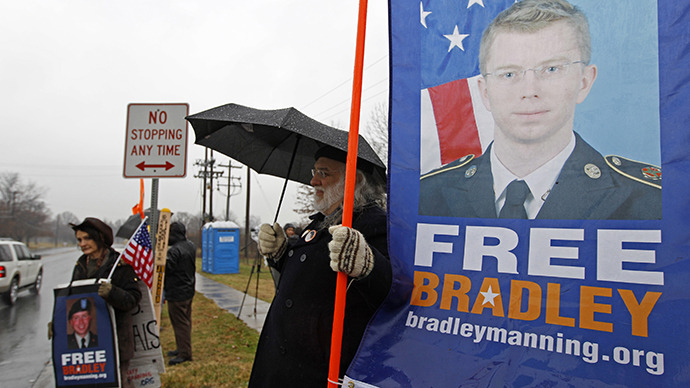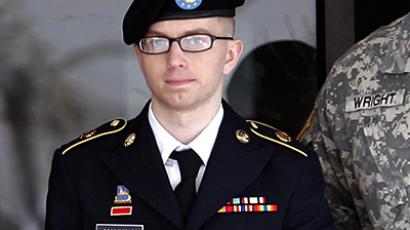Army forced to release documents related to secretive Bradley Manning case

After over one-thousand days of secretive legal proceedings, the United States government has released a small portion of the thousands of pages of courtroom documents from the case against alleged WikiLeaks source Pfc. Bradley Manning.
Manning, a 25-year-old Army intelligence specialist, was arrested in May 2010 and accused of passing hundreds of thousands of sensitive military documents to the anti-secrecy whistleblower site while working as an intelligence officer in Iraq. The soldier is scheduled to be formally court-martialed beginning this June and could be sentenced to life in prison for his role in providing WikiLeaks with privileged material. Since details from the pre-trial motion hearings have been scarce, however, little has been known publically about the government’s prosecution until now.
On Wednesday, the Military District of Washington informed members of the press that 84 judicial orders and rulings from the pre-trial hearings have been reviewed, redacted and uploaded to a military-run website where they can be viewed “In response to various Freedom of Information Act (FOIA) requests and inquiries from news agencies.” The trove so far includes minor legal rulings regarding Pfc. Manning’s proposed plea, court orders sent to mental health professionals and other rulings made by the judge.
The Army says that the seven-dozen documents published on Wednesday make up just a small sampling of the more than 500 files that have already been either filed by attorneys for both sides in the matter or the military judge presiding over the case, Col. Denise Lind. In all, those documents total more than 30,000 pages, and the Army says materials will be continuously published online as they are prepared for release. They warn the media, however, that “due to the voluminous nature of these documents,” it could be a long time coming before the rest of the papers are vetted appropriately for publication.
Some of the newly released documents are over a year old and it won’t be reasonable or effective if the press is allowed to lay their hands on the current rulings at the end of this year, Kevin Gosztola,a journalist covering the case told RT.
“The contents weren’t available for anyone to go back and
reference, we were unable to use them,” Gosztola said. “The
issue has been that there are no records available so it makes it
difficult for the press to cover the proceedings. Now we have a
smidgen of transparency, it is a bit less secretive, but we’ll see
what the army has planned for the coming months.”
The statement from the military comes just one day after Col. Lind ruled that although Pfc. Manning has been detained for over 1,000 days, the government did not violate the speedy trial statute in the military’s Rules for Courts-Martial. Lind admitted to the court that delays in the case have occurred in part due to the continuous efforts the government has undertaken to audit the trove of documents relevant to the case, but said the defense was not hindered by the slow-moving trial. David Coombs, the civilian defense attorney for Pfc. Manning, had unsuccessfully asked the judge to dismiss all charges against his client due to the lingering, nearly three-year process.
Previously, Coombs implored the court to free Pfc. Manning by arguing that the treatment his client endured while detained in a military brig after being captured was tantamount to torture. Lind agreed, in part, and said 112 days will be subtracted off of any sentence handed to the officer. When Coomb’s latest request was declined, however, journalist Ed Pilkington wrote for The Guardian that the government’s absurd quest for total secrecy has left Manning to stand trial in an “Alice-in-Wonderland world.”
“Lind spent an hour and a half without pause reading out a judgment that must have stretched to 50 pages, at a rate that rendered accurate reporting of it diabolically difficult,” he said of Lind’s response to Coomb’s last unsuccessful appeal. “No copy of the ruling has – then or now – been made available to the public, presumably on grounds of national security, even though every word of the document had been read out to the very public that was now being withheld its publication.”
“This prosecution, as it is currently conceived, could have a chilling effect on public accountability that goes far beyond the relatively rarefied world of WikiLeaks,” Pilkington wrote. Only hours later, the Army said they would start releasing courtroom filings.
Last May, the Center for Constitutional Rights sued the US government over the lack of transparency in the Manning trial. “Public scrutiny plays a vital role in government accountability. Media access to the Manning trial proceedings and documents is critical for the transparency on which democratic government and faith in our justice system rests,” CCR Legal Director Baher Azmy said in a statement when the petition against the Army Court of Criminal Appeals was filed. Additionally, a legal brief urging the government to release documents was filed last September and endorsed by The Associated Press, Atlantic Media, Dow Jones, Gannett, Hearst, CNN, McClatchy, The New York Times, The New York Daily News, Reuters, the Washington Post and other media outlets.
Pfc. Manning is expected to testify on Thursday this week when he is scheduled to formally offer a plea. He may avoid a life sentencing by pleading guilty to lesser charges.














